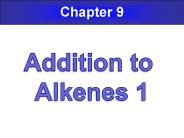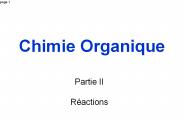Carbocations PowerPoint PPT Presentations
All Time
Recommended
Then consider the relative migratory aptitude of the groups that will undergo 1,2-shift. Migratory aptitude aryl alkyl usually H alkyl ...
| PowerPoint PPT presentation | free to view
Structure, Bonding, and Stability of Carbocations Figure 4.8 Structure of methyl cation. Carbon is sp2 hybridized. All four atoms lie in same plane.
| PowerPoint PPT presentation | free to download
Experimetal evidence for charge delocalization onto Co2(CO)6 moiety: ... remote propargylic moiety. Syn form (benzyloxy and phenyl) = most ...
| PowerPoint PPT presentation | free to view
Solvent effects: Any property of a solvent system that can ... Common Ion (Mass Law) Effect. Special Salt Effect. Factors that influence carbocation formation ...
| PowerPoint PPT presentation | free to view
Carbocations are electrophiles (electron-seekers) ... electrophile (Lewis acid) Fig. 4.11 Combination of tert-butyl cation and ...
| PowerPoint PPT presentation | free to download
Carbocations rearrange. Reaction of benzene with n-propyl chloride and AlCl3 produces isopropylbenzene. The alkylbenzene product is more reactive than benzene, so ...
| PowerPoint PPT presentation | free to download
3-Bromo-1-butene is formed faster than. 1-bromo-2-butene because allylic carbocations ... 1-Bromo-2-butene is more stable than. 3-bromo-1-butene because it has a ...
| PowerPoint PPT presentation | free to download
Y. H. Y. d d. 12.1. Representative Electrophilic Aromatic Substitution ... Rearrangements in Friedel-Crafts Alkylation. Carbocations are intermediates. ...
| PowerPoint PPT presentation | free to download
More substituted carbocations have more possible hyperconjugation interactions. vacant p-orbital 4.11: Effect of Alcohol Structure on Reaction Rate.
| PowerPoint PPT presentation | free to download
2. Relative stability and rearrangements of carbocations ... a. Two-step substitution. b. Unsymmetrical stabilization of a carbocation ...
| PowerPoint PPT presentation | free to view
Boron is more stable being bonded to oxygen. Hydration. Addition Reactions. no carbocations are formed in hydroboration reactions, hence no hydride (or alkyl) shifts ...
| PowerPoint PPT presentation | free to download
The addition of H2 to a double bond leads to the saturated alkane ... Vinal cations are significantly less stable than saturated carbocations ...
| PowerPoint PPT presentation | free to view
However, a carbocation forms .! But aren t carbocations UNSTABLE ? ... The negative ion then attacks the carbocation minor How about this reaction .?
| PowerPoint PPT presentation | free to view
The remaining sp orbitals form bonds to other atoms at 180 to C-C triple bond. ... Primary vinyl carbocations probably do not form at all ...
| PowerPoint PPT presentation | free to view
Certain carbocations may exist as structures in which the positive charge is ... the vi editor and some commands (e.g., grep) as indicated in the lab handout. ...
| PowerPoint PPT presentation | free to view
Markovnikov's Rule In an addition reaction the more ... Summary of H-X Addtion Reactions. nucleophile. electrophile. or. more stable carbocation. 3 2 ...
| PowerPoint PPT presentation | free to download
Figure 4.9 Structure of tert-Butyl Cation. Positively charged carbon is ... Consider the three-step mechanism for the reaction of tert-butyl alcohol with HCl. ...
| PowerPoint PPT presentation | free to view
Chapter 10. Conjugation in Alkadienes and. Allylic Systems. conjugare is a Latin verb meaning 'to ... The Double Bond as a Substituent. C. C. C. allylic ...
| PowerPoint PPT presentation | free to download
colorings adjusted to the same scale. 1-propyl cation. CH3-CH2. t-BUTYL CARBOCATION = (CH3)3C ... HO HO !!! LUMO-MAN. CH3-CH2 216.789 kcal / mole. CH3-CH-CH3 ...
| PowerPoint PPT presentation | free to view
Mechanism of the Reaction of Alcohols with Hydrogen Halides About mechanisms A mechanism describes how reactants are converted to products. Mechanisms are often ...
| PowerPoint PPT presentation | free to download
Have a chirality axis. Chiral Allenes. C. C. C. analogous to ... with a left-hand thread. a right-handed helix and a left-handed helix. Chirality Axis ...
| PowerPoint PPT presentation | free to view
Conjugation in Alkadienes and Allylic Systems conjugare is a Latin verb meaning
| PowerPoint PPT presentation | free to view
Chimie Organique Partie II R actions
| PowerPoint PPT presentation | free to download
Substitution and Elimination Reaction of Alkyl Halides By: Ismiyarto, MSi * 4 18 18 9 9 21 21 2 4 6 6 8 11 6 2 6 26 29 32 H C C A B X Y H H H syn-Addition; Metal ...
| PowerPoint PPT presentation | free to download
limited to industrial syntheses of ethylene, propene, 1,3 ... fewest hydrogens. R. OH. CH3. C. C. H. R. CH2R. three protons on this b carbon. The Zaitsev Rule ...
| PowerPoint PPT presentation | free to download
Conjugation and Color. Visible region is... Extended systems of conjugation absorb in visible region. b-Carotene, 11 double bonds in conjugation, max = 455 nm ...
| PowerPoint PPT presentation | free to view
As with catalytic cracking, the main reactions occur by carbonium ion and beta scission, yielding two fragments that could be hydrogenated on the catalyst surface.
| PowerPoint PPT presentation | free to download
REACTION MECHANISMS IN ORGANIC CHEMISTRY Imortant Terms: Electrophiles: electron poor reagents, they seek electrons. Nucleophiles: electron rich reagents, they donate ...
| PowerPoint PPT presentation | free to download
Alkenes and alkynes The chemistry of unsaturation
| PowerPoint PPT presentation | free to view
The Ten Commandments of Organic Chemistry. Thou shalt not make more than four bonds to carbon. ... Organic chemists shall not deal with d or f orbitals. ...
| PowerPoint PPT presentation | free to view
... made major research and pedagogic contributions to mechanistic organic chemistry. ... successful text 'Basic Principles of Organic Chemistry' (1964), written with ...
| PowerPoint PPT presentation | free to view
Steric Hindrance Issues Sites that are sterically hindered can be blocked and may undergo very little substitution. These include: - a site that has two ortho ...
| PowerPoint PPT presentation | free to download
Chapter 4 Alcohols and Alkyl Halides
| PowerPoint PPT presentation | free to download
Coverage of the chapter (2) alkane halogen. R-H X2 R-X H-X ... Physical Properties of Alcohols and Alkyl Halides. Boiling point Solubility in water Density ...
| PowerPoint PPT presentation | free to view
La sustituci n nucleof lica consiste en reemplazar un grupo por otro ... La piridina se usa como solvente en la reacci n solo para atrapar el i n ...
| PowerPoint PPT presentation | free to view
Title: OC 2/e 6 Subject: Alkenes II Author: Bill Brown Description: Same format as Alkenes I Last modified by: Bill Brown Created Date: 7/13/1997 8:01:25 AM
| PowerPoint PPT presentation | free to download
Substitution and Elimination Reaction of Alkyl Halides By: Ismiyarto, MSi ALKIL HALIDA Manfaat (Pestisida, Bahan Dasar Sintesis Alkohol, Alkena) Struktur (Metil ...
| PowerPoint PPT presentation | free to download
Rationale for cyclohexyl tosylate solvolysis. cont'd. -Hydrogen participation ... Solvolysis of unsaturated tosylates. Possible explanations for solvolysis of ...
| PowerPoint PPT presentation | free to view
Electrophilic Addition of Hydrogen Halides to Alkenes Electrophilic addition of hydrogen halides to alkenes proceeds by rate-determining formation of a carbocation ...
| PowerPoint PPT presentation | free to download
Chapter 6 Ionic Reactions---Nucleophilic substitution and elimination reactions of alkylhalides (
| PowerPoint PPT presentation | free to view
Chapter 6: Reactions of Alkenes: Addition Reactions 6.1: Hydrogenation of Alkenes addition of H-H (H2) to the -bond of alkenes to afford an alkane.
| PowerPoint PPT presentation | free to download
Organic Chemistry 6th Edition Paula Yurkanis Bruice Chapter 7 Delocalized Electrons and Their Effect on Stability, Reactivity, and pKa More About Molecular
| PowerPoint PPT presentation | free to view
Chapter 6: Reactions of Alkenes: Addition Reactions 6.1: Hydrogenation of Alkenes addition of H-H (H2) to the -bond of alkenes to afford an alkane.
| PowerPoint PPT presentation | free to download
nitrosation of secondary amines gives an N-nitroso amine. Dr. Wolf's CHM 201 & 202 ... nitrosation of a primary alkylamine gives an alkyl diazonium ion ...
| PowerPoint PPT presentation | free to view
... polarity causes the carbon to become activated to substitution reactions with nucleophiles. Carbon-halogen bonds get less polar, longer and weaker in going ...
| PowerPoint PPT presentation | free to download
6. Alkenes: Structure and Reactivity Based on McMurry s Organic Chemistry, 6th edition * * Problem 6.48: mechanism? * Problem 6.49: mechanism?
| PowerPoint PPT presentation | free to view
Chapter 7 Alkenes: Structure and Reactivity Chapter 7 Alkenes: Structure and Reactivity John E. McMurry www.cengage.com/chemistry/mcmurry Paul D. Adams University ...
| PowerPoint PPT presentation | free to view
TEMA 7 ALQUENOS TEMA 7 ALQUENOS Una vez formado el alquilborano, el boro vuelve a tener el octete incompleto y puede reaccionar con otros dos moles de olefina.
| PowerPoint PPT presentation | free to download
Docent: Prof. dr. Floris Rutjes. Werkcollege assistenten: Pieter de Witte. Bas Gruijters ... Hoor- en werkcolleges worden door elkaar heen gegeven. College ...
| PowerPoint PPT presentation | free to view
Alkynes: An Introduction to Organic Synthesis Based on McMurry s Organic Chemistry, 7th edition, Chapter 8 * 8.8 Alkylation of Acetylide Anions Reaction with a ...
| PowerPoint PPT presentation | free to view
Carbanions have 8 valence electrons and. a negative charge ... seek electrons to obtain a stable valence shell of electrons. electron-deficient themselves ...
| PowerPoint PPT presentation | free to download
... for steric effects, such as gauche interactions, that are not primarily electrostatic in nature. ... Butane (gauche) -157.9618318; 2.2 -811/9.9; -0.8 ...
| PowerPoint PPT presentation | free to view
Title: HIDROCARBUROS Author: Intel Last modified by: Usuario Created Date: 9/3/2002 2:48:23 AM Document presentation format: Presentaci n en pantalla (4:3)
| PowerPoint PPT presentation | free to download
Electrostatic Effects in Organic Chemistry A guest lecture given in CHM 425 by Jack B. Levy March, 2003 University of North Carolina at Wilmington
| PowerPoint PPT presentation | free to download
Now create Grignard and then react Grignard ... has 3d orbitals ... Milder oxidizing reagents can also be used Tollens Reagent test for aldehydes Drastic ...
| PowerPoint PPT presentation | free to download
























































